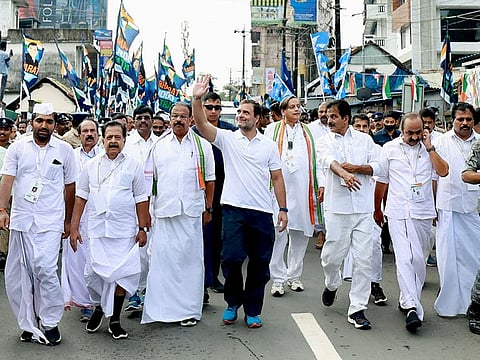In India, a mass political mobilisation is underway
Rahul Gandhi’s Bharat Jodo Yatra aims to mobilise masses to recommit to secularism

India’s main political opposition Congress Party and several sociocultural organisations started a 3,700-kilometre-long Bharat Jodo Yatra (United India March) on 7 September.
Rahul Gandhi is leading this foot march, aiming to mobilise the masses to reconfirm their commitment to a secular democratic India.
He is expected to walk for almost five months, and his journey has started from the southern tip of India, Kanyakumari, and will end at Srinagar in Kashmir.
The presence of Tamil Nadu’s Chief Minister and DMK leader MK Stalin on the first day of the march clearly shows that this political mobilisation is not limited to the Congress Party, though the party is leading it.
When this foot march by Rahul Gandhi gets completed as planned, it will be historic as no other democratic leader anywhere in the world has ever undertaken this Gandhian-style mass contact programme on such a mammoth scale.
Even though most Indian media have been cynical about the importance and outcome of the Rahul Gandhi-led Bharat Jodo Yatra, there are clear signs of increasing popular support for it, at least in the areas it has passed during the last week.
It will be premature to assess whether this gruelling political exercise of five months will bring any electoral dividends for the Congress Party or wipe away the question mark over Rahul Gandhi’s political strategy and commitment to fight tough political battles.
The stock-taking of those outcomes will not be possible even when the march is completed in five months; for that to do correctly, the political pundits must wait till the next election in 2024.
However, one thing is for sure: Bharat Jodo Yatra has already started to shift the focus of the national political discourse.
Principle of majoritarianism
For several years now, the dominant political game has been to polarise the country based on religion and propagate the principle of majoritarianism and move away from secularism.
Bharat Jodo Yatra has started bringing back the country’s focus on accepting the importance of unity in diversity.
Before the nation aspires to be a new India or number one, it must first remain as a united India. No country has achieved economic development, political stability, and foreign policy success while suffering from a high degree of polarisation.
It is common knowledge that India’s secular fabric has been under increasing threats in recent years. Majoritarian mob attacks have grown in frequency.
It is not uncommon to see open calls for violence against minorities on social media. In India, majoritarian vigilante groups have got a free run in some cases. Several recent laws and policies on citizenship may not pass the fairness litmus test. The list is long.
The country’s much-vaunted democracy has survived so long on the strength of country’s secular values, norms, and principles. However, the dilution of that secular character has also started raising serious question marks.
By derailing from the path of secularism, there is no doubt that India’s democratic fibre is facing several social, political, and institutional challenges.
Enlarging economic fault line
Though India’s expanding social and religious divisions are more visible, the country is also experiencing an enlarging economic fault line. India has recently become the 5th largest economy in the world, surpassing the UK, but its per capita GDP is still 22 times less than that of the UK.
High unemployment and the pandemic have stalled India’s five decades of uninterrupted progress in poverty reduction. While two Indians are now among the ten wealthiest people on the planet, India’s position on Human Development Index has slipped two positions, from 130th in 2020 to 132nd in 2021.
The country needs to move away urgently from the politics of divide and hate to the politics of unity and reconciliation. The time will tell whether Rahul Gandhi’s Bharat Jodo Yatra might or might not bring any political dividend to him or his Congress Party.
However, this epic foot march has undoubtedly done an enormous service to the country for making a serious and sincere attempt to restart a political mobilisation against majoritarianism and focusing on the values and importance of secularism.




